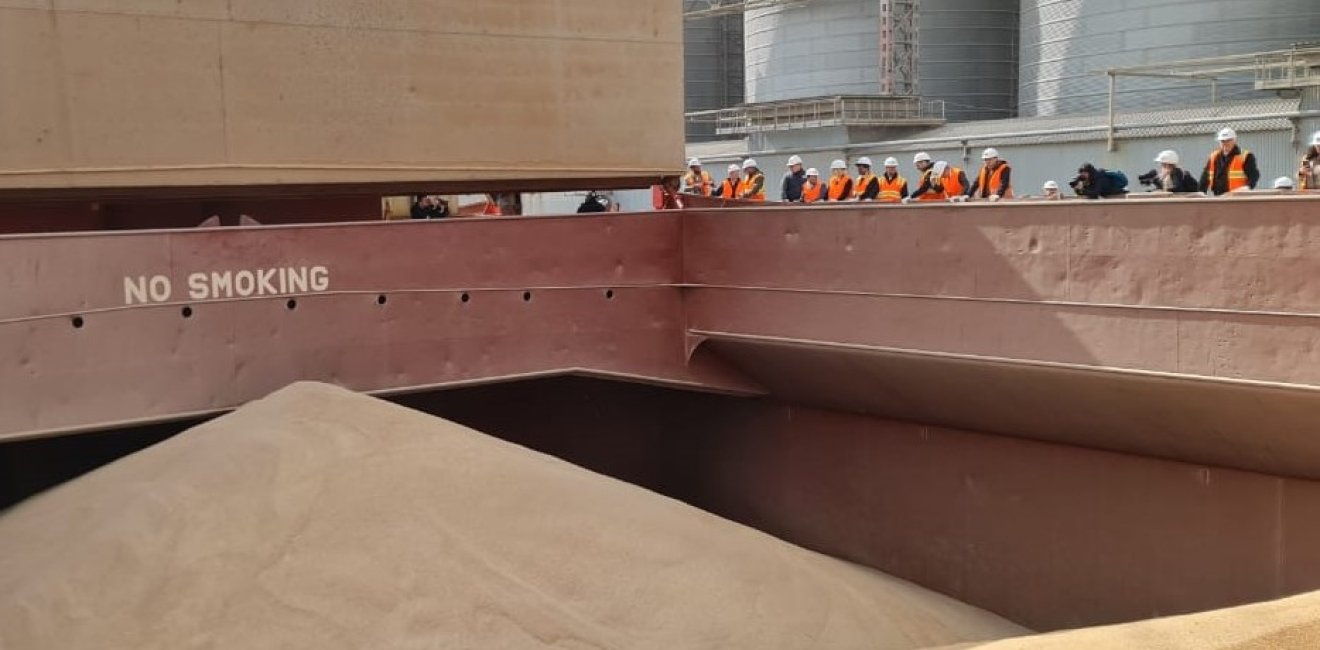
A blog of the Kennan Institute
Updated on Oct. 6, 2023.
Ukraine and Poland have had a difficult relationship for hundreds of years. After Ukraine’s independence in 1991, relations were relaunched on a more positive footing, and in recent years seemed to have normalized. An underlying comity has remained even through the sharp disagreements over how historical events shared by both countries should be perceived.
The dispute over grain transit through Ukraine’s neighbors has introduced a new wobble in this unstable equilibrium. Though the dispute is not based in historical memory issues, such issues are likely to emerge and shape foreign and domestic policy as Poland undergoes parliamentary elections, scheduled for October 15.
A History of Polish Support
In 1989, when Solidarity came to power in Poland after democratic elections, the Polish parliament supported Ukraine’s aspirations for democracy and independence. The Polish Senate supported Ukraine’s Declaration of State Sovereignty in 1990, and Poland was the first country to recognize Ukrainian independence in 1991. On January 8, 1992, diplomatic relations were established, and in May of that year Ukrainian president Leonid Kravchuk visited Poland, signing the Treaty on Good Neighborliness, Friendly Relations and Cooperation.
More exchange visits followed, and in March 1994 an additional document was signed, “On the Principles of Ukrainian-Polish Partnership,” in which the foreign affairs ministers of the two states for the first time explicitly recognized at an interstate level the importance of the bilateral strategic relationship.
For several years, the cooperation and friendship signaled between Poland and Ukraine remained more formal than actual. A radical shift took place when Aleksander Kwaśniewski was elected president of Poland. As a result of his vision of Ukraine as a strategic partner and of good personal relations between the two presidents, Poland became one of Ukraine’s strongest supporters in Europe. Toward the end of his second term, President Kwaśnieski helped broker “a pro-democratic agreement” during the 2004 Orange Revolution, and he was also an active mediator during the February 2014 Revolution of Dignity.
Historical Memory Issues Come to the Fore
Kravchuck’s successors as Ukraine’s president, Viktor Yushchenko and Petro Poroshenko, followed his initiative in pursuing close bilateral cooperation. During their terms in office, however, the historical memory issue blew up, casting a shadow on the relationship that was difficult to overcome with gestures of goodwill or formal declarations.
One important and seemingly intractable issue is how to characterize the Volhynia massacres of 1943 to 1945, which, as Alex Perez-Reyes writes in a previous Focus Ukraine piece, “Poland regards as genocide and Ukraine regards as the unfortunate actions of partisan groups against the Poles, with subsequent retaliatory killings of Ukrainian citizens.”
Such deeply sensitive moments in a shared history have left space for manipulations of historical interpretation that have soured relations. Provocations, such as the vandalizing of memorials, became particularly frequent after Russia invaded Ukraine in 2014. (There are hints of Russia’s hand in some instances, as Russia is deeply interested in Ukraine not having good relations with neighbors.)
The years of the highest number of vandalism acts, 2016–17, saw some Ukrainian officials banned from visiting Poland. In 2017, Donald Tusk, president of the European Council, former Polish prime minister, and former vice chair of the Polish Senate, wondered about the worsening relations between the two countries: Was it a strategy of the Polish ruling party, Law and Justice, or was it the Kremlin’s plan?
A few months earlier, Kwaśniewski, during his speech in Kyiv at the 14th Yalta European Strategy Conference, had noted the growing risk of worsening relations due to rising nationalism in Poland.
In 2018 the crack in bilateral relations based on historical memory widened when the Polish parliament amended its law On the Institute of National Remembrance. The amended law, known as the anti-defamation law, added criminal penalties to the expression of certain views on twentieth-century history by either Poles or foreigners. Its immediate effect was to sharpen the conflict between the two countries over the interpretation of painful events in their shared history and how those events should be appropriately commemorated; some articles of the law specifically mention Ukraine. Though the law was openly criticized by U.S. and Israeli officials, Kyiv under Poroshenko was restrained in its response so as not to worsen the situation.
Shortly after Volodymyr Zelensky was elected president in 2019, he had a warm meeting with Polish president Andrzej Duda in an effort to reboot relations, and they met again in the next couple of years. In February 2022, just a week before the Russian invasion, Ukraine, together with Poland and the UK, announced a new strategic cooperative alliance designed to contribute to security and develop trade among the three states.
Poland demonstrated vital support to Ukraine when Russia invaded, and relations seemed stronger than ever, even as unresolved historical interpretations lingered in the background. In May 2022, Polish president Duda, speaking before the Ukrainian parliament, pledged to open the border between the two countries and establish a new Ukraine-Poland alliance against Russia.
The Grain Import Crisis
But a new crack in relations appeared in the middle of this year with the grain transit crisis. When Russia reneged on the grain agreement and started blocking Ukraine’s grain exports through the Black Sea, Kyiv began looking for a way to export overland through neighboring states.
Surplus grain caused dissatisfaction among local farmers in those states, who feared lower prices for their products, and Warsaw (along with Slovakia and Hungary) became worried that some Ukrainian grain would find its way into the Polish marketplace and compete there, despite Ukraine promising that would not happen. Poland therefore joined a few other countries in demanding that the EU ban these shipments.
In May, in part to avoid unilateral trade bans, considered illegal under the EU charter, the European Commission imposed a temporary ban, which expired in mid-September. Despite Kyiv’s expressed readiness to control its grain transit, Warsaw was not satisfied, and imposed a unilateral ban on the import of several grains and flours. Kyiv responded by promising to take its case to the World Trade Organization and threating to embargo some Polish food imports. The Polish prime minister responded with hints of additional embargoes and, worse, announced Poland would no longer transfer military matériel to Ukraine.
Poland has been one of Ukraine’s staunchest supporters during Russian’s war on Ukraine, and the announcement caused shock waves throughout the West. Though President Duda later walked back the comments of his prime minister, saying that Poland would only refrain from supplying its latest weaponry, the damage was done. The tit-for-tat escalation of a trade disagreement has reached a somber point that could inflict serious harm on both countries in the near future, and it is not something either country wants.
Historical Memory Issues Feared Likely to Deepen Divisions
Though this crisis so far appears free of a historical memory context, historical issues will assuredly deepen any ongoing conflict over grain supplies. The entanglements are likely to arise in the political arena, from party platforms and policies intended to appeal to voting blocs and from the usual coalition building that follows elections.
The tenor of some administration statements already dredges up some deep Polish history, paving the way for memory issues, waiting in the wings.
The Polish prime minister, Mateusz Morawiecki, said his country would not allow a “flood” of Ukrainian grain, while the Polish president, speaking at the UN, compared Ukraine to a “drowning man.” These elocutions point back to the time known to Poles as the “deluge,” a period of war with Sweden in the seventeenth century that resulted in a deep and long-standing crisis with huge economic and human losses.
In summoning historical tropes, the administration is preparing the way for memory issues to drive electoral messaging. That could amplify the economic frictions and questions about refugee aid currently on the front burner.
Poland’s parliamentary elections are scheduled for mid-October, and an undeniable fact is that “economic nationalism” has become a part of the political race. Though most Poles have a positive attitude toward Ukrainians, a nationalist contingent is still strong in Poland and may contribute to further deterioration in bilateral relations if nationalism is levied to gain political benefits.
How might this happen?
The grain import issue is a burning topic for all parties as they jockey for position in the runup to the elections. The ruling Law and Justice party, generally a right-wing, populist party, is providing subsidies to farmers and upholding the expired EU embargo on grain import. Rural voters are key to Law and Justice retaining power, but the party may have to form a coalition with parties more to the right, which have played up war fatigue and a notional turn toward ending financial aid to Ukrainian refugees.
Coalition building in the post-election phase requires a certain amount of political bargaining. The multiple frictions with Ukraine that are expected to help structure such bargaining would create a fertile arena for historical memory issues to once more become wedge issues. A nationalist sentiment drawing on the depths of feeling in which historical memory is steeped could drag President Duda’s administration in a direction it would prefer not to go. The bilateral relationship would inevitably become more complicated, with Russia the only victor.
“No Free Poland without a Free Ukraine”
Poland and Ukraine have both mounted emotional responses in the grain dispute, even though the problem was predictable and could have been prevented. They will find a way to compromise. The larger question is the fate of the bilateral relationship. Both states will lose if the dispute is allowed to develop further. And Poland will not win if Ukraine loses. As the twentieth-century Polish writer, lawyer, and political activist Jerzy Giedroyc said, “There can be no free Poland without a free Ukraine.”
Ukraine and Poland should behave as they did during the late Soviet era when they supported each other’s struggle for independence and the Kremlin was the enemy of both. It still is. By working together, Kyiv and Warsaw can thwart Russia’s imperialist dreams.
The opinions expressed in this article are those solely of the author and do not reflect the views of the Kennan Institute.
Author

Director, Energy Program, Ukrainian Institute for the Future

Kennan Institute
The Kennan Institute is the premier US center for advanced research on Eurasia and the oldest and largest regional program at the Woodrow Wilson International Center for Scholars. The Kennan Institute is committed to improving American understanding of Russia, Ukraine, Central Asia, the South Caucasus, and the surrounding region through research and exchange. Read more

Explore More in Focus Ukraine
Browse Focus Ukraine
Talking to the Dead to Heal the Living

Ukrainian Issue in Polish Elections


